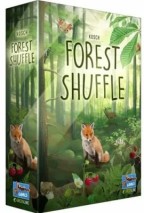Check availability or place holds:
View Board Games in catalogue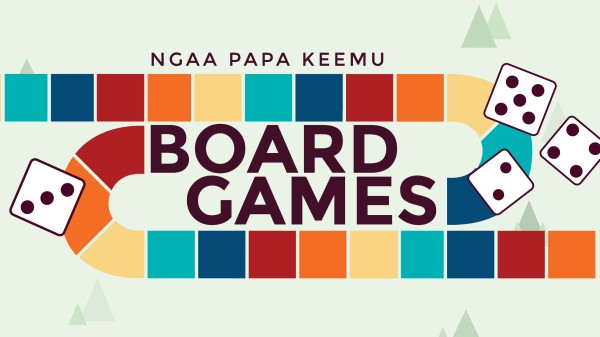
Discover hours of fun and enjoyment with our wide collection of board games, available from Saturday 1 June!
A collection of board games offers more than just entertainment. It also supports the development of literacy skills, promotes social interaction, encourages communication abilities, and fosters teamwork and collaboration.
-
Items cost $5 to borrow for two weeks.
-
Holds can be placed on all items in this collection for a small charge of $1.50.
-
Items can be returned to any of our libraries during opening hours.
-
Overdue fees are charged at $1.00 a day.
-
Please be aware that board game items can only be issued to adult and young adult cardholders.
Check availability or place holds:
View Board Games in catalogueThe Board Games
 Complexity: 2/5
Complexity: 2/5
Players: 3-7
Ages: 10+
Estimated play time: 30 minutes
You are the leader of one of the 7 great cities of the Ancient World. Gather resources, develop commercial routes, and affirm your military supremacy. Build your city and erect an architectural wonder which will transcend future times. In essence, 7 Wonders is a card development game. Some cards have immediate effects, while others provide bonuses or upgrades later in the game. Some cards provide discounts on future purchases. Some provide military strength to overpower your neighbors and others give nothing but victory points. Each card is played immediately after being drafted, so you'll know which cards your neighbor is receiving and how her choices might affect what you've already built up. Cards are passed left-right-left over the three ages, so you need to keep an eye on the neighbors in both directions.
 Complexity: 1/5
Complexity: 1/5
Players: 2-7
Ages: 8+
Estimated play time: 25 minutes
In 7 Wonders Architects players receive an unconstructed wonder at the beginning of the game and must collect resources to build their society, develop military might to navigate conflicts, oversee resource management, research science improvements, and collect civil victory points as they race to leave their mark on world history.
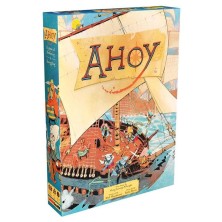 Complexity: 3/5
Complexity: 3/5
Players: 2-4
Ages: 14+
Estimated playing time: 45-75 minutes
Ahoy is a lightly asymmetrical game where two to four players take the roles of swashbucklers and soldiers seeking fame on the high seas. One player controls The Bluefin Squadron and the other The Mollusk Union, and you'll compete to control different areas of the revealed terrain, with exploration revealing new lands over which to fight. When you add a third or fourth player, they each act as smugglers who are trying to pick up various items and deliver them to indicated areas. As you play, you’ll make a unique map full of treasure troves, dangerous wreckage, and mighty sea currents.
Complexity: 1/5
Players: 2-7
Ages: 8+
Estimated play time: 25 minutes
In Apiary, each player controls one of twenty unique factions. Your faction starts the game with a hive, a few resources, and worker bees. A worker-placement, hive-building challenge awaits you: explore planets, gather resources, develop technologies, and create carvings to demonstrate your faction's strengths (measured in victory points) over one year's Flow. However, the Dearth quickly approaches, and your workers can take only a few actions before they must hibernate! Can you thrive or merely survive?
Complexity: 3/5
Players: 1-5
Ages: 12+
Estimated playing time: 60-80 minutes
The aim of Architects of the West Kingdom is to be the player with the most victory points (VP) at game's end. Points are gained by constructing various buildings and advancing work on the Archbishop's cathedral. Throughout the game, players need to make a lot of moral decisions. However, only at game's end will their virtue be judged. A few underhand deals here and there might not seem like much, but fall too far and you will be punished. The game ends once a set number of constructions have been completed.
Complexity: 2/5
Players: 2-4
Ages: 8+
Estimated playing time: 30-45 minutes
In the game Azul, players take turns drafting colored tiles from suppliers to their player board. Later in the round, players score points based on how they've placed their tiles to decorate the palace. Extra points are scored for specific patterns and completing sets; wasted supplies harm the player's score. The player with the most points at the end of the game wins.
Complexity: 4/5
Players: 2-4
Ages: 14+
Estimated playing time: 60-120 minutes
Brass: Birmingham is an economic strategy game of competing entrepreneurs in Birmingham during the industrial revolution, between the years of 1770-1870. Players must develop, build, and establish your industries and network, in an effort to exploit low or high market demands. The game is played over two halves: the canal era (years 1770-1830) and the rail era (years 1830-1870). To win the game, score the most VPs. VPs are counted at the end of each half for the canals, rails and established (flipped) industry tiles.
 Complexity: 2/5
Complexity: 2/5
Players: 3-8
Ages: 8+
Estimated playing time: 30-45 minutes
In Camel Up, up to eight players bet on five racing camels, trying to suss out which ones will place first and second in a quick race around a pyramid. The earlier you place your bet, the more you can win — should you guess correctly, of course. Camels don't run neatly, however, sometimes landing on top of another one and being carried toward the finish line. Who's going to run when? That all depends on how the dice come out of the pyramid dice shaker, which releases one die at a time when players pause from their bets long enough to see who's actually moving!
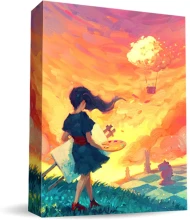 Complexity: 2/5
Complexity: 2/5
Players: 1-5
Ages: 10+
Estimated playing time: 30 minutes
In Canvas, you play as a painter competing in an art competition. Players will collect art cards, layering 3 of them together to create their own unique Painting. Each card contains a piece of artwork as well as a set of icons used during scoring. Icons will be revealed or hidden based on the way players choose to layer the cards making for an exciting puzzle. Paintings are scored based on a set of Scoring cards which will change each game. Once players have created and scored 3 paintings the game ends.
 Complexity: 2/5
Complexity: 2/5
Players: 2-5
Ages: 7+
Estimated playing time: 30-45 minutes
Carcassonne is a tile-placement game in which the players draw and place a tile with a piece of southern French landscape on it. The tile might feature a city, a road, a cloister, grassland or some combination thereof, and it must be placed adjacent to tiles that have already been played, in such a way that cities are connected to cities, roads to roads, etcetera. Having placed a tile, the player can then decide to place one of their meeples on one of the areas on it: on the city as a knight, on the road as a robber, on a cloister as a monk, or on the grass as a farmer. When that area is complete, that meeple scores points for its owner.
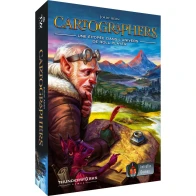 Complexity: 2/5
Complexity: 2/5
Players: 1-9
Ages: 10+
Estimated playing time: 30-45 minutes
In Cartographers: A Roll Player Tale, players compete to earn the most reputation stars by the time four seasons have passed. Each season, players draw on their map sheets and earn reputation by carrying out the queen's edicts before the season is over. The player with the most reputation stars at the end of winter wins!
Complexity: 2/5
Players: 1-4
Ages: 10+
Estimated play time: 30-45 minutes
Cascadia is a puzzly tile-laying game featuring the habitats and wildlife of the Pacific Northwest! In Cascadia, players take turns building their terrain and populating it with wildlife. Players must create a diverse and harmonious ecosystem – each animal species has a different spatial preference and each habitat must be placed to reduce fragmentation and create wildlife corridors.
 Complexity: 1/5
Complexity: 1/5
Players: 2-8
Ages: 14+
Estimated playing time: 15 minutes
In Codenames, two teams compete to see who can make contact with all of their agents first. Lay out 25 cards, each bearing a single word. The spymasters look at a card showing the identity of each card, then take turns clueing their teammates. A clue consists of a single word and a number, with the number suggesting how many cards in play have some association to the given clue word. The teammates then identify one agent they think is on their team; if they're correct, they can keep guessing up to the stated number of times; if the agent belongs to the opposing team or is an innocent bystander, the team's turn ends; and if they fingered the assassin, they lose the game.
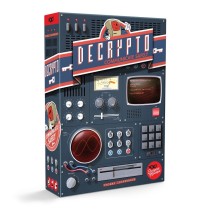 Complexity: 2/5
Complexity: 2/5
Players: 3-8
Ages: 12+
Estimated playing time: 15-45 minutes
Players compete in two teams in Decrypto, with each trying to correctly interpret the coded messages presented to them by their teammates while cracking the codes they intercept from the opposing team.
 Complexity: 2/5
Complexity: 2/5
Players: 2-6
Ages: 10+
Estimated playing time: 45-120 minutes
In Villainous, each player takes control of one of six Disney characters, each one a villain in a different Disney movie. Each player has their own villain deck, fate deck, player board, and 3D character. On a turn, the active player moves their character to a different location on their player board, takes one or more of the actions visible on that space (often by playing cards from their hand), then refills their hand to four cards. Cards are allies, items, effects, conditions, and (for some characters) curses. You need to use your cards to fulfill your unique win condition.
 Complexity: 1/5
Complexity: 1/5
Players: 3-8
Ages: 8+
Estimated playing time: 30 minutes
Each turn in Dixit, one player is the storyteller, chooses one of the six cards in their hand, then makes up a sentence based on that card's image and says it out loud without showing the card to the other players. Each other player then selects the card in their hand that best matches the sentence and gives the selected card to the storyteller, without showing it to anyone else. The storyteller shuffles their card with all of the received cards, then reveals all of these cards. Each player other than the storyteller then secretly guesses which card belongs to the storyteller. If nobody or everybody guesses the correct card, the storyteller scores 0 points, and each other player scores 2 points. Otherwise, the storyteller and whoever found the correct answer score 3 points. Additionally, the non-storyteller players score 1 point for every vote received by their card.
Complexity: 2/5
Players: 2-4
Ages: 13+
Estimated playing time: 30 minutes
In Dominion, each player starts with an identical, very small deck of cards. In the center of the table is a selection of other cards the players can "buy" as they can afford them. Through their selection of cards to buy, and how they play their hands as they draw them, the players construct their deck on the fly, striving for the most efficient path to the precious victory points by game end.
Complexity: 3/5
Players: 1-4
Ages: 14+
Estimated playing time: 60-120 minutes
Dune: Imperium is a game that uses deck-building to add a hidden-information angle to traditional worker placement. As a leader of one of the Great Houses of the Landsraad, raise your banner and marshal your forces and spies. War is coming, and at the center of the conflict is Arrakis – Dune, the desert planet. Defeat your rivals in combat, shrewdly navigate the political factions, and acquire precious cards. The Spice must flow to lead your House to victory!
 Complexity: 1/5
Complexity: 1/5
Players: 2-4
Ages: 8+
Estimated playing time: 10 minutes
In the action-packed Dungeons & Dragons card game Dungeon Mayhem, you win by being the last adventurer standing. Play as one of four brave, quirky characters — barbarian, paladin, rogue, or wizard — battling it out in a dungeon full of treasure! With magic missiles flinging, dual daggers slinging, and spiked shields dinging, it's up to you to prove your adventurer has the guts to bring home the glory!
Complexity: 3/5
Players: 1-4
Ages: 10+
Estimated playing time: 40-80 minutes
Everdell is a game of dynamic tableau building and worker placement. You will be the leader of a group of critters intent on just such a task. There are buildings to construct, lively characters to meet, events to host—you have a busy year ahead of yourself. Will the sun shine brightest on your city before the winter moon rises?
Complexity: 3/5
Players: 1-5
Ages: 13+
Estimated playing time: 45-90 minutes
Earth is an engine and tableau builder for 1 to 5 players with simple rules but tons of strategic possibilities. With its encyclopedic nature and the enormous number of unique cards and combinations, every single game will allow you to discover new synergies and connections, just as our vast and fascinating world allows us to do!
Complexity: 1/5
Players: 2-5
Ages: 7+
Estimated playing time: 15 minutes
Exploding Kittens is a kitty-powered version of Russian Roulette. Players take turns drawing cards until someone draws an exploding kitten and loses the game. The deck is made up of cards that let you avoid exploding by peeking at cards before you draw, forcing your opponent to draw multiple cards, or shuffling the deck. The game gets more and more intense with each card you draw because fewer cards left in the deck means a greater chance of drawing the kitten and exploding in a fiery ball of feline hyperbole.
Complexity: 3/5
Players: 2-4
Ages: 13+
Estimated playing time: 40 - 80 minutes
Five Tribes, in a unique twist on the now-standard "worker placement" genre, the game begins with the meeples already in place – and players must cleverly maneuver them over the villages, markets, oases, and sacred places tiles that make up Naqala. How, when, and where you dis-place these Five Tribes of Assassins, Elders, Builders, Merchants, and Viziers determine your victory or failure. The rules are straightforward and easy to learn. But devising a winning strategy will take a more calculated approach than our standard fare. You need to carefully consider what moves can score you well and put your opponents at a disadvantage.
Complexity: 2/5
Players: 1-5
Ages: 10+
Estimated play time: 60 minutes
In Flamecraft, 1-5 players take on the role of Flamekeepers, gathering items, placing dragons and casting enchantments to enhance the shops of the town. Dragons are specialized (bread, meat, iron, crystal, plant and potion) and the Flamekeepers know which shops are the best home for each. Visit a shop to gain items and a favor from one of the dragons there. Gathered items can be used to enchant a shop, gaining reputation and the favors of all the dragons in the shop. If you are fortunate enough to attract fancy dragons then you will have opportunities to secure even more reputation.
Complexity:2.5/5
Players: 1-4
Ages: 14+
Estimated playing time: 90-180 minutes
In God of War: The Card Game, players take on the role of the Norns, powerful individuals from mythology, as they try different combinations of heroes and Quests in order to stop Ragnarök. Each Quest is made up of a mosaic of cards, representing the foe that the Norns must fight against.
Complexity: 2/5
Players: 1-4
Ages: 10+
Estimated playing time: 30-45 minutes
In Harmonies, build landscapes by placing colored tokens and create habitats for your animals. To earn the most points and win the game, incorporate the habitats in your landscapes wisely and have as many animals as you can settle there.
Complexity: 2/5
Players: 1-6
Ages: 10+
Estimated playing time: 30-60 minutes
Based on simple and intuitive hand management, Heat: Pedal to the Metal puts players in the driver's seat of intense car races, jockeying for position to cross the finish line first, while managing their car's speed if they don't want to overheat. Selecting the right upgrades for their car will help them hug the curves and keep their engine cool enough to maintain top speeds. Ultimately, their driving skills will be the key to victory! Drivers can compete in a single race or use the "Championship System" to play a whole season in one game night, customizing their car before each race to claim the top spot of the podium. They have to be careful as the weather, road conditions, and events will change every race to spice up their championship. Players can also enjoy a solo mode with the Legends Module or add automated drivers as additional opponents in multiplayer games.
 Complexity: 2/5
Complexity: 2/5
Players: 1-5
Ages: 10+
Estimated playing time: 60 minutes
Horrified includes high-quality sculpted miniatures (Frankenstein, The Bride of Frankenstein, The Wolf Man, Dracula, The Mummy, The Invisible Man, Creature from the Black Lagoon). Its innovative, easy-to-learn, cooperative gameplay has players working together against the monsters with varying levels of difficulty. Just as each monster is unique, they require different strategies and tactics to be defeated.
Complexity: 1/5
Players: 3-10
Ages: 8+
Estimated play time: 30 minutes
Gather around with three to ten people to play Hues and Cues, a quick and simple game with a prism of possibilities! First, a “cue giver” hides a specific color they’ve chosen out of a deck of cards. There are 480 shades on the board in front of you! After getting one- and two-word cues, everyone places their marker on which color they think is being described. “Coffee.” Is it dark brown, as in freshly brewed? “Au lait.” With milk. That means I should pick a lighter shade! Use examples from everyday life, from nature to pop culture, or materials and moods. Everyone around the table gets a turn to give cues and guess. The better your hints or guesses, the more points you earn. Play off others' experiences to narrow down what they have in mind!
 Complexity: 2/5
Complexity: 2/5
Players: 2-6
Ages: 8+
Estimated playing time: 30-60 minutes
Jamaica is a pirate-themed tactical race game with player interaction and side goals (e.g. detouring for treasure). The winner is the player who best balances their position in the race with their success at the side goals. The game ends on the turn when at least one player's ship reaches the finish line, completing one circuit around the island of Jamaica. At that point, players are awarded different amounts of gold in accordance with how far away from the finish line they were when the race concluded. This gold is added to any gold a player gathered along the way by detouring from the race to search for valuable treasure, by stealing gold or treasure from other players, or just by loading gold as directed by the cards the player played during the race. The player with the most total gold acquired through all these means is then declared the winner.
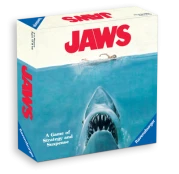 Complexity: 2/5
Complexity: 2/5
Players: 2-4
Ages: 12+
Estimated play time: 60 minutes
In JAWS, one player takes on the role of the killer shark off Amity Island, while the other 1-3 players take on the roles of Brody, Hooper and Quint to hunt the shark. Character and event cards define player abilities and create game actions for humans and the shark. Gameplay is divided into two acts — Amity Island and The Orca — played on a double-sided board to replicate the film's story. If humans kill the shark, they win; if the shark attack on the Orca succeeds, the great white shark wins.
 Complexity: 1/5
Complexity: 1/5
Players: 2-6
Ages: 8+
Estimated playing time: 30 minutes
In King of Tokyo, you play mutant monsters, gigantic robots, and strange aliens—all of whom are destroying Tokyo and whacking each other in order to become the one and only King of Tokyo. At the start of each turn, you roll six dice, which show the following six symbols: 1, 2, or 3 Victory Points, Energy, Heal, and Attack. Over three successive throws, choose whether to keep or discard each die in order to win victory points, gain energy, restore health, or attack other players into understanding that Tokyo is YOUR territory.
Complexity: 1/5
Players: 2-4
Ages: 8+
Estimated playing time: 15-25 minutes
In Kingdomino, you are a lord seeking new lands in which to expand your kingdom. You must explore all the lands, including wheat fields, lakes, and mountains, in order to spot the best plots, while competing with other lords to acquire them first. The game uses tiles with two sections, similar to Dominoes. Each turn, each player will select a new domino to connect to their existing kingdom, making sure at least one of its sides connects to a matching terrain type already in play. The order of who picks first depends on which tile was previously chosen, with better tiles forcing players to pick later in the next round. The game ends when each player has completed a 5x5 grid (or failed to do so), and points are counted based on number of connecting tiles and valuable crown symbols.
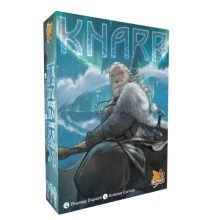 Complexity: 2/5
Complexity: 2/5
Players: 2-4
Ages: 8+
Estimated play time: 30 minutes
You are the leader of a band of Vikings that you send to new destinations. Manage the recruitment of your crew, and choose the best territories to explore. Depending on the destinations reached (for trading or influence) and the Vikings who accompany you, you can increase your reputation to gain even more wealth.
Complexity: 2/5
Players: 2
Ages: 10+
Estimated playing time: 30-40 minutes
In Duel for Middle Earth, play as Sauron or the Fellowship of the Ring: the destiny of Middle-earth is in your hands! Develop your strategy and try to lead your camp to victory. But pay attention-in this epic duel, 3 immediate victory conditions will require crucial choices every turn.
 Complexity: 3/5
Complexity: 3/5
Players: 2-5
Ages: 12+
Estimated playing time: 60-120 minutes
In Lords of Waterdeep, a strategy board game for 2-5 players, you take on the role of one of the masked Lords of Waterdeep, secret rulers of the city. Through your agents, you recruit adventurers to go on quests on your behalf, earning rewards and increasing your influence over the city. Expand the city by purchasing new buildings that open up new actions on the board, and hinder – or help – the other lords by playing Intrigue cards to enact your carefully laid plans. During the course of play, you may gain points or resources through completing quests, constructing buildings, playing intrigue cards or having other players utilize the buildings you have constructed. At the end of 8 rounds of play, the player who has accrued the most points wins the game.
Complexity: 3/5
Players: 1-4
Ages: 12+
Estimated playing time: 30-120 minutes
Lost Ruins of Arnak combines deck-building and worker placement in a game of exploration, resource management, and discovery. In addition to traditional deck-builder effects, cards can also be used to place workers, and new worker actions become available as players explore the island. Some of these actions require resources instead of workers, so building a solid resource base will be essential. You are limited to only one action per turn, so make your choice carefully... what action will benefit you most now? And what can you afford to do later... assuming someone else doesn't take the action first!?
 Complexity: 1/5
Complexity: 1/5
Players: 2-4
Ages: 8+
Estimated playing time: 30 minutes
You’ve just taken home your new bookshelf and now it’s time to put your favorite items in the display: books, board games, portraits. Who will show the best organized shelfie? A game of strategy and chance, and different every time thanks to the variety of common and personal goals. The beautiful images of the item tiles will really give you the feeling of tidying up your precious shelf.
 Complexity: 2/5
Complexity: 2/5
Players: 2-7
Ages: 10+
Estimated playing time: 40 minutes
In Mysterium, one player takes the role of ghost while everyone else represents a medium. To solve the crime, the ghost must first recall (with the aid of the mediums) all of the suspects present on the night of the murder. Unable to talk, the amnesiac ghost communicates with the mediums through visions, which are represented in the game by illustrated cards. The mediums must decipher the images to help the ghost remember how he was murdered: Who did the crime? Where did it take place? Which weapon caused the death? The more the mediums cooperate and guess well, the easier it is to catch the right culprit.
 Complexity: 3/5
Complexity: 3/5
Players: 2-5
Ages: 10+
Estimated playing time: 45-75 minutes
In Notre Dame, players take on the roles of the heads of influential families in Paris at the end of the 14th century. In the shadow of the Notre Dame cathedral, the players compete for prosperity and reputation. Each family controls one of the 3–5 boroughs that surround the site of Notre Dame. As head of his family, each player tries, through clever use of his action cards, to advance the power and prestige of his family, but penalties are assessed on those who do not take care of the health of the people who live in their borough. The player with the most prestige at the end is the winner.
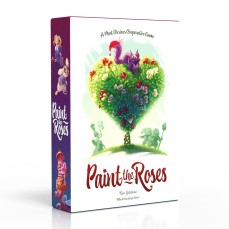 Complexity: 2/5
Complexity: 2/5
Players: 2-5
Ages: 11+
Estimated playing time: 50-70 minutes
Paint the Roses is set in the puzzling world of Alice in Wonderland and you and your friends are the newly appointed Royal Gardeners. You are working together to finish the palace grounds according to the whims of the Queen of Hearts. Use strategy, logic, and teamwork to finish the garden whilst staying one step ahead of the Queen, otherwise, the last thing you hear will be, "Off With Their Heads!".
Complexity: 2/5
Players: 2-4
Ages: 8+
Estimated playing time: 45 minutes
In Pandemic, several virulent diseases have broken out simultaneously all over the world! The players are disease-fighting specialists whose mission is to treat disease hotspots while researching cures for each of four plagues before they get out of hand. On each turn, a player can use up to four actions to travel between cities, treat infected populaces, discover a cure, or build a research station. A deck of cards provides the players with these abilities, but sprinkled throughout this deck are "Epidemic!" cards that accelerate and intensify the diseases' activity. A second, separate deck of cards controls the "normal" spread of the infections.
Complexity: 2/5
Players: 1-5
Ages: 10+
Estimated playing time: 30-60 minutes
In PARKS, players will take on the role of two hikers as they trek through different trails across four seasons of the year. While on the trail, these hikers will take actions and collect memories of the places your hikers visit. These memories are represented by various resource tokens like mountains and forests. Collecting these memories in sets will allow players to trade them in to visit a National Park at the end of each hike.
CURRENTLY UNAVAILABLE FOR LOAN
Complexity: 2/5
Players: 2-4
Ages: 10+
Estimated playing time: 30-60 minutes
The sun shines brightly on the canopy of the forest, and the trees use this wonderful energy to grow and develop their beautiful foliage. Sow your crops wisely and the shadows of your growing trees could slow your opponents down, but don't forget that the sun revolves around the forest. Welcome to the world of Photosynthesis, the green strategy board game!
Complexity: 3/5
Players: 2-6
Ages: 12+
Estimated playing time: 120 minutes
The objective of Power Grid is to supply the most cities with power when someone's network gains a predetermined size. In this new edition, players mark pre-existing routes between cities for connection, and then bid against each other to purchase the power plants that they use to power their cities. However, as plants are purchased, newer, more efficient plants become available, so by merely purchasing, you're potentially allowing others access to superior equipment. Additionally, players must acquire the raw materials (coal, oil, garbage, and uranium) needed to power said plants (except for the 'renewable' windfarm/ solar plants, which require no fuel), making it a constant struggle to upgrade your plants for maximum efficiency while still retaining enough wealth to quickly expand your network to get the cheapest routes.
Complexity: 4/5
Players: 2-4
Ages: 10+
Estimated playing time: 60-90 minutes
Root is a game of adventure and war in which 2 to 4 players battle for control of a vast wilderness. Each player in Root has unique capabilities and a different victory condition. Stalk the woods as one of the Vagabonds, seize the initiative with the Eyrie birds of prey, rule over your subjects as the Marquise de Cat, or command the Woodland Alliance to create a new order. With creatures and cunning, you'll rule a fantastic forest kingdom in the ultimate asymmetric board game of adventure and war.

Players: 1-4
Ages: 14+
Estimated playing time: 30-45 minutes
Draft dice and use the tools-of-the-trade in Sagrada to carefully construct your stained glass window masterpiece. Each player builds a stained glass window by building up a grid of dice on their player board. Each board has some restrictions on which color or shade (value) of die can be placed there. Dice of the same shade or color may never be placed next to each other. Dice are drafted in player order, with the start player rotating each round, snaking back around after the last player drafts two dice. Scoring is variable per game based on achieving various patterns and varieties of placement...as well as bonus points for dark shades of a particular hidden goal color.
Complexity: 4/5
Players: 1-5
Ages: 14+
Estimated playing time: 90-115 minutes
Scythe is an engine-building game set in an alternate-history 1920s period. It is a time of farming and war, broken hearts and rusted gears, innovation and valor. In Scythe, each player represents a character from one of five factions of Eastern Europe who are attempting to earn their fortune and claim their faction's stake in the land around the mysterious Factory. Players conquer territory, enlist new recruits, reap resources, gain villagers, build structures, and activate monstrous mechs.
 Complexity: 2/5
Complexity: 2/5
Players: 3-6
Ages: 10+
Estimated playing time: 60-75 minutes
Embark on a quest to settle the fair isle of Catan! Guide your brave settlers to victory by using clever trading and development. Use resources (grain, wool, ore, brick, and lumber) to build roads, settlements, and cities, and buy development cards. Acquire your resources through trades or the role of the dice. But beware! You never know when someone might cut off your road or if the robber will appear and steal your precious gains. Are you the best trader, builder, or settler? Will you master Catan?
Complexity: 2/5
Players: 3-5
Ages: 14+
Estimated playing time: 60 minutes
In Sheriff of Nottingham, players will not only be able to experience Nottingham as a merchant of the city, but each turn one player will step into the shoes of the Sheriff himself. Players declare goods they wish to bring into the city, goods that are secretly stored in their burlap sack. The Sheriff must then determine who gets into the city with their goods, who gets inspected, and who may have their goods confiscated! Do you have what it takes to be seen as an honest merchant? Will you make a deal with the Sheriff to let you in? Or will you persuade the Sheriff to target another player while you quietly slip by the gate? Declare your goods, negotiate deals, and be on the lookout for the Sheriff of Nottingham!
 Complexity: 2/5
Complexity: 2/5
Players: 2
Ages: 12+
Estimated play time: 15 minutes
Sky Team is a co-operative game, exclusively for two players, in which you play a pilot and co-pilot at the controls of an airliner. Your goal is to work together as a team to land your airplane in different airports around the world. To land your plane, you need to silently assign your dice to the correct spaces in your cockpit to balance the axis of your plane, control its speed, deploy the flaps, extend the landing gear, contact the control tower to clear your path, and even have a little coffee to improve your concentration enough to change the value of your dice. If the aircraft tilts too much and stalls, overshoots the airport, or collides with another aircraft, you lose the game.
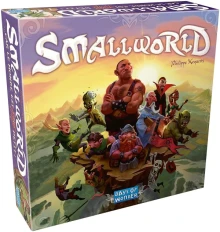 Complexity: 2/5
Complexity: 2/5
Players: 2-5
Ages: 8+
Estimated playing time: 40-80 minutes
In Small World, players vie for conquest and control of a world that is simply too small to accommodate them all. Picking the right combination from the 14 different fantasy races and 20 unique special powers, players rush to expand their empires - often at the expense of weaker neighbors. Yet they must also know when to push their own over-extended civilization into decline and ride a new one to victory!
Complexity: 4/5
Players: 1-4
Ages: 13+
Estimated playing time: 90-120 minutes
Spirit Island is a complex and thematic cooperative game about defending your island home from colonizing Invaders. Players are different spirits of the land, each with its own unique elemental powers. Every turn, players simultaneously choose which of their power cards to play, paying energy to do so. Using combinations of power cards that match a spirit's elemental affinities can grant free bonus effects. Faster powers take effect immediately, before the Invaders spread and ravage, but other magics are slower, requiring forethought and planning to use effectively. In the Spirit phase, spirits gain energy, and choose how / whether to Grow: to reclaim used power cards, to seek for new power, or to spread presence into new areas of the island.
 Complexity: 2/5
Complexity: 2/5
Players: 2-4
Ages: 10+
Estimated playing time: 30 minutes
Splendor is a game of chip-collecting and card development. Players are merchants of the Renaissance trying to buy gem mines, means of transportation, shops—all in order to acquire the most prestige points. If you're wealthy enough, you might even receive a visit from a noble at some point, which of course will further increase your prestige.
Complexity: 2.7/5
Players: 1-4
Ages: 13+
Estimated playing time: 45-200 minutes
Help wanted! You've inherited your grandfather's old farm plot in Stardew Valley. Armed with hand-me-down tools and a few coins, you set out to begin your new life! Work together to fulfill your Grandpa's goals and restore the once-vibrant Community Center.
Complexity: 2/5
Players: 2-4
Ages: 10+
Estimated playing time: 60-90 minutes
In Stone Age, the players collect wood, break stone and wash their gold from the river. They trade freely, expand their village and so achieve new levels of civilization. With a balance of luck and planning, the players compete for food in this pre-historic time. Players use up to ten tribe members each in three phases. In the first phase, players place their men in regions of the board that they think will benefit them, including the hunt, the trading center, or the quarry. In the second phase, the starting player activates each of their staffed areas in whatever sequence they choose, followed in turn by the other players. In the third phase, players must have enough food available to feed their populations, or they face losing resources or points.
Complexity: 2/5
Players: 2-4
Ages: 8+
Estimated playing time: 45-60 minutes
Survive is a cutthroat game where players seek to evacuate their pieces from an island that is breaking up, while remembering where their highest-valued pieces are located to maximize their score. An island made up of 40 hex-tiles is slowly sinking into the ocean (as the tiles are removed from the board). Each player controls ten people (valued from 1 to 6) that they try and move towards the safety of the surrounding islands before the main island finally blows up. Players can either swim or use boats to travel but must avoid sea serpents, whales and sharks on their way to safety.
Complexity: 1/5
Players: 2-8
Ages: 8+
Estimated playing time: 20 minutes
In the super-fast sushi card game Sushi Go Party, you are eating at a sushi restaurant and trying to grab the best combination of sushi dishes as they whiz by. Score points for collecting the most sushi rolls or making a full set of sashimi. Dip your favorite nigiri in wasabi to triple its value! And once you've eaten it all, finish your meal with all the pudding you've got! But be careful which sushi you allow your friends to take; it might be just what they need to beat you!
 Complexity: 4/5
Complexity: 4/5
Players: 2-5
Ages: 12+
Estimated playing time: 60-150 minutes
Terra Mystica is a full information game, without any luck, that rewards strategic planning. Each player governs one of the 14 groups. With subtlety and craft, the player must attempt to rule as great an area as possible and to develop that group's skills. There are also four religious cults in which you can progress. To do all that, each group has special skills and abilities. Taking turns, the players execute their actions on the resources they have at their disposal. Different buildings allow players to develop different resources. Dwellings allow for more workers. Trading houses allow players to make money. Strongholds unlock a group's special ability, and temples allow you to develop religion and your terraforming and seafaring skills. Buildings can be upgraded: Dwellings can be developed into trading houses; trading houses can be developed into strongholds or temples; one temple can be upgraded to become a sanctuary. Each group must also develop its terraforming skill and its skill with boats to use the rivers
Complexity: 3/5
Players: 1-5
Ages: 12+
Estimated playing time: 120 minutes
In the 2400s, mankind begins to terraform the planet Mars. Giant corporations, sponsored by the World Government on Earth, initiate huge projects to raise the temperature, the oxygen level, and the ocean coverage until the environment is habitable. In Terraforming Mars, you play one of those corporations and work together in the terraforming process, but compete for getting victory points that are awarded not only for your contribution to the terraforming, but also for advancing human infrastructure throughout the solar system, and doing other commendable things.
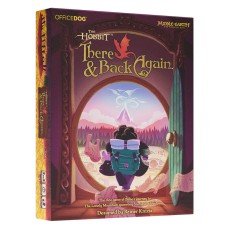 Complexity: 2/5
Complexity: 2/5
Players: 1-4
Ages: 10+
Estimated playing time: 30 minutes
The Hobbit: There & Back Again is a competitive adventure game in which players draft dice to make pathways, collect resources, and perform actions that help them to reach their chapter goal. The game takes players through the eight most iconic challenges faced by Bilbo and the Dwarves in The Hobbit, such as overcoming trolls, goblins, wargs, and giant spiders; reclaiming the treasure of the dwarves; and defeating the dragon Smaug. In the end, you want to complete the most rewarding journey to The Lonely Mountain.
CURRENTLY UNAVAILABLE FOR LOAN
Complexity: 2/5
Players: 2-6
Ages: 12+
Estimated playing time: 60 minutes
The Hunger is a race in which each vampiric player must optimize their card deck, hunt humans to gain victory points, fulfill secret missions, and eventually acquire a rose and return to the castle before sunrise. The more you hunt, the slower both you and your deck become, which will make it harder and harder to get back before daybreak. Can you become the most notorious vampire without burning to ashes at sunrise?
 Complexity: 2/5
Complexity: 2/5
Players: 1-4
Ages: 8+
Estimated playing time: 60-90 minutes
The Isle of Cats is a competitive, medium-weight, card-drafting, polyomino cat-placement board game for 1-4 players. In the game, you are citizens of Squalls End on a rescue mission to The Isle of Cats and must rescue as many cats as possible before the evil Lord Vesh arrives. Each cat is represented by a unique tile and belongs to a family, you must find a way to make them all fit on your boat while keeping families together.
Complexity: 3/5
Players: 1-4
Ages: 12+
Estimated play time: 60-90 minutes
The Pursuit of Happiness is a game in which you take a character from birth and you live the life you always wanted. Using a worker-placement mechanism with time as your workers, you take on projects, you get jobs, you buy items, you establish relationships, you raise families. The possibilities are endless as you live the life you have always wanted.ely survive?
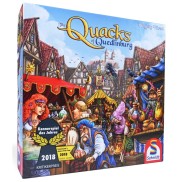 Complexity: 2/5
Complexity: 2/5
Players: 2-4
Ages: 10+
Estimated play time: 45 minutes
In The Quacks of Quedlinburg, players are charlatans — or quack doctors — each making their own secret brew by adding ingredients one at a time. Take care with what you add, though, for a pinch too much of this or that will spoil the whole mixture! Each player has their own bag of ingredient chips. During each round, they simultaneously draw chips from their bags and add them to their pots. The higher the face value of the drawn chip, the further it is placed in the pot's swirling pattern, increasing how much the potion will be worth. Push your luck as far as you can, but if you add too many cherry bombs, your pot will explode!
 Complexity: 2/5
Complexity: 2/5
Players: 1-4
Ages: 13+
Estimated play time: 60-75 minutes
In The Search for Planet X, players take on the role of astronomers who use observations and logical deductions to search for this hypothetical planet. Each game, the companion app randomly selects an arrangement of objects and a location for Planet X following predefined logic rules. Each round, as the earth travels around the sun, players use the app to perform scans and attend conferences. As they gain information about the location of the objects, they mark that information on their deduction sheets. As players learn the locations of the various objects, they can start publishing theories, which is how players score points.
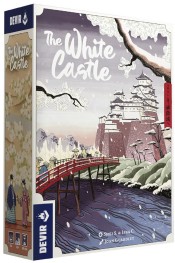 Complexity: 3/5
Complexity: 3/5
Players: 1-4
Ages: 12+
Estimated playing time: 80 minutes
The White Castle is set in Japan, 1761: Harima province, with mechanics of resource management, worker placement and dice placement to carry out actions. Players take on the role of leaders of minor clans, who vie for position and their clan's future in the court of the White Heron. To achieve influence, they will have to insert members of their family into every level of life within the White Castle, from political roles to military positions, and even down to the lowliest landscape workers, who care for the smallest details of the palace's gardens. Cunning and timely management of resources and the placement of family members within Himeji Castle will be the key to victory!
Complexity: 3/5
Players: 2-5
Ages: 14+
Estimated playing time: 75 minutes
The Wolves is a pack-building strategy game for 2-5 players. It's survival of the fittest as you compete to build the largest, most dominant pack by claiming territory, recruiting lone wolves, and hunting prey. But be careful not to expand too recklessly into terrain where your rivals thrive – they may lure members of your pack away. A clever action-selection mechanism drives your choices. Each action requires you to flip terrain tiles matching the terrain where you wish to take your action. These double-sided tiles mean the actions you take this round will set up which terrain types you can act on in the next round. As you take actions to expand your pack's control of each region, you also upgrade your pack's attributes, allowing you to take more aggressive actions as the game goes on.
 Complexity: 2/5
Complexity: 2/5
Players: 2-5
Ages: 8+
Estimated playing time: 30-60 minutes
With elegantly simple gameplay, Ticket to Ride can be learned in under 15 minutes. Players collect cards of various types of train cars they then use to claim railway routes in North America. The longer the routes, the more points they earn. Additional points come to those who fulfill Destination Tickets – goal cards that connect distant cities; and to the player who builds the longest continuous route.
 Complexity: 2/5
Complexity: 2/5
Players: 2-5
Ages: 8+
Estimated playing time: 45 minutes
In Tokaido, each player is a traveler crossing the "East sea road", one of the most magnificent roads of Japan. While traveling, you will meet people, taste fine meals, collect beautiful items, discover great panoramas, and visit temples and wild places but at the end of the day, when everyone has arrived at the end of the road you'll have to be the most initiated traveler – which means that you'll have to be the one who discovered the most interesting and varied things. All of the actions in Tokaido are very simple, and combined with a unique graphic design, Tokaido offers players a peaceful zen mood in its play.
 Complexity: 2/5
Complexity: 2/5
Players: 1-4
Ages: 10+
Estimated playing time: 30-60 minutes
In the game of Trekking Through History, you go on a three-day tour of human history, traveling thousands of years in a time machine to experience great moments from our past. The game takes place over three rounds, each representing one day of your trip. Each day, you visit a series of historical events, spending a different number of hours at each. On each turn, you choose to visit one historical event, and spend a certain number of hours doing it. Doing so will yield benefits, like checking off items on your itinerary for points, and earning Time Crystals so you can bend the space-time continuum on future turns.
Complexity: 1/5
Players: 2-8
Ages: 8+
Estimated playing time: 15-20 minutes
A beautiful and beautifully simple game of laying a tile before your own token to continue its path on each turn. The goal is to keep your token on the board longer than anyone else's, but as the board fills up this becomes harder because there are fewer empty spaces left... and another player's tile may also extend your own path in a direction you'd rather not go. Easy to introduce to new players, Tsuro lasts a mere 15 minutes and actually does work for any number from 2 to 8.
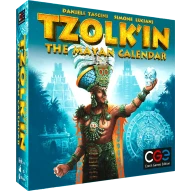 Complexity: 4/5
Complexity: 4/5
Players: 2-4
Ages: 13+
Estimated play time: 90 minutes
Tzolkin: The Mayan Calendar presents a new game mechanism: dynamic worker placement. Players representing different Mayan tribes place their workers on giant connected gears, and as the gears rotate they take the workers to different action spots. During a turn, players can either (a) place one or more workers on the lowest visible spot of the gears or (b) pick up one or more workers. Players pay to place workers and perform certain actions based on the worker's current location when they pick them up. Actions located "later" on the gears are more valuable, so it's wise to let the time work for you – but players cannot skip their turn; if they have all their workers on the gears, they have to pick some up. The game ends after one full revolution of the central Tzolkin gear. There are many paths to victory. Pleasing the gods by placing crystal skulls in deep caves or building many temples are just two of those many paths...
Complexity: 1/5
Players: 2-8
Ages: 8+
Estimated playing time: 30-60 minutes
Unstable Unicorns is a strategic card game about everyone’s two favorite things: Destruction and Unicorns! There are over 20 Magical Unicorns to collect, and each has a special power. Build your Unicorn Army as fast as you can, or be destroyed by one of your so-called friends! Seek revenge or protect your stable using your Magic! Sound easy? Not so fast. Someone could have a Neigh Card (Get it? Neigh?) and send the game into MADNESS! The first person to complete their Unicorn Army shall hereafter be known as The Righteous Ruler of All Things Magical... at least until the next game. Good luck.
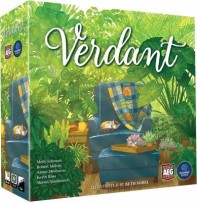 Complexity: 2/5
Complexity: 2/5
Players: 1-5
Ages: 10+
Estimated playing time: 45-60 minutes
A puzzly spatial card game for 1 to 5 players. You take on the role of a houseplant enthusiast trying to create the coziest interior space by collecting and arranging houseplants and other objects within your home. You must position your plants so that they are provided the most suitable light conditions and take care of them to create the most verdant collection.
Complexity: 3/5
Players: 2-6
Ages: 13+
Estimated playing time: 90 minutes
In Viticulture, the players find themselves in the roles of people in rustic, pre-modern Tuscany who have inherited meager vineyards. They have a few plots of land, an old crushpad, a tiny cellar, and three workers. They each have a dream of being the first to call their winery a true success. The players are in the position of determining how they want to allocate their workers throughout the year. Every season is different on a vineyard, so the workers have different tasks they can take care of in the summer and winter. There's competition over those tasks, and often the first worker to get to the job has an advantage over subsequent workers. Using those workers and visitors, players can expand their vineyards by building structures, planting vines (vine cards), and filling wine orders (wine order cards). Players work towards the goal of running the most successful winery in Tuscany.
Complexity: 2/5
Players: 1-5
Ages: 10+
Estimated playing time: 40-70 minutes
Wingspan is a competitive, medium-weight, card-driven, engine-building board game from Stonemaier Games. It's designed by Elizabeth Hargrave and features over 170 birds illustrated by Beth Sobel, Natalia Rojas, and Ana Maria Martinez. You are bird enthusiasts—researchers, bird watchers, ornithologists, and collectors—seeking to discover and attract the best birds to your network of wildlife preserves. Each bird extends a chain of powerful combinations in one of your habitats (actions).
Complexity: 3/5
Players: 1-4
Ages: 14+
Estimated play time: 90 minutes
During a game of Wyrmspan, you will build a sanctuary for dragons of all shapes and sizes. Your sanctuary begins with 3 excavated spaces—the leftmost space in your Crimson Cavern, your Golden Grotto, and your Amethyst Abyss. Over the course of the game, you will excavate additional spaces in your sanctuary and entice dragons to live there, chaining together powerful abilities and earning the favor of the Dragon Guild.

